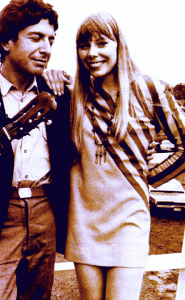Archive | Book Matters
For Most Great Artists, We Find a Season (Even in the Bowels of February)

Eve Babitz and colleague
The wonderful writer Eve Babitz, whose essays about mid-century LA evoke a paradise lost that has become meta since she stopped publishing two decades ago, tells a story about the first time she tried caviar. When she realized it didn’t appeal to her, she simply put it down and decided to wait until it did. She wasn’t, she declared, about to become a person who didn’t like caviar. And when, decades later, she was offered the highest grade of Russian caviar atop a perfect silver spoon with a perfect dollop of crème fraiche, she finally became a person who did.
That’s how I feel about certain artists. There are some I’ll never dig, like the Beach Boys. (Their paradise lost doesn’t appeal to me; I blame their thin-voiced harmonies.) And then there are some who I haven’t experienced in the correct context. Yet. Whether I am wallowing in such melancholia that I can’t surrender to their joy, have not achieved the gravitas for their depth, or just really, really need that silver spoon, there are some artists whose innate value I grok but have yet to fully embrace.
Certainly one of the great pleasures of being on the planet for a while is not only growing out of some passions but also growing into others. When I was a young person, Ella Fitzgerald seemed forced but by the time I’d weathered some serious sorrow, I recognized her cheer stemmed from a choice to not wallow in her own hard times—that she shone colors I’d never have recognized lest I’d made that choice myself. The rush of Beethoven seemed less ecstatic than bombastic when I played violin, but now that I am a mere listener I can ride his tidal waves as gaily as everyone else does. It wasn’t til I dated a Bolognese man that I summoned the patience for Michelangelo Antonioni. The joyous complexity of nonvocal jazz never registered with me until I learned to shut the fuck up rather than sing along. And it wasn’t until I became a grown-up lady that my own concern with money and manners brought me to Edith Wharton’s.
So I guess I’m just waiting for my Leonard Cohen revelation. I adore his influence: Who else can claim to have inspired a trio of songs as tremendous as Joni Mitchell’s “A Case of You,” “Rainy Night House” and “That Song About the Midway?” I adore covers of his work: Like pretty much everyone else, I cry whenever I hear Jeff Buckley’s cover of “Halleluja.” But the moment still hasn’t arrived when Cohen is the only person I want to hear. It’ll come, though. I’m a little afraid of what may happen in my life to make his singularly sweet, deceptively simple sadness essential but I feel it coming.
I’m happy to wait.
The Farewell Symphony, Across Space and Time
 As Joshua’s words come echoing across the water and down the years to me, I can’t help thinking that his life was not just his finest thoughts about poetry and friendship, expressed in a style that rejected forcefulness in favor of sympathy, but it was also comprised of his long mornings in his dressing gown with his telephone, newspapers, the Hu Kwa smoked tea and the little sterling-silver strainer that sat in its drip cup when it wasn’t straddled across a cup catching leaves. His life was made up of his pleasure in the morning glories as well as his hilarity ….After [his death] I looked through all the letters I’d ever received from Joshua and I realized I’d been unworthy of him then, that he’d been sending them through time to me as I would become years later. –Edmund White, The Farewell Symphony
As Joshua’s words come echoing across the water and down the years to me, I can’t help thinking that his life was not just his finest thoughts about poetry and friendship, expressed in a style that rejected forcefulness in favor of sympathy, but it was also comprised of his long mornings in his dressing gown with his telephone, newspapers, the Hu Kwa smoked tea and the little sterling-silver strainer that sat in its drip cup when it wasn’t straddled across a cup catching leaves. His life was made up of his pleasure in the morning glories as well as his hilarity ….After [his death] I looked through all the letters I’d ever received from Joshua and I realized I’d been unworthy of him then, that he’d been sending them through time to me as I would become years later. –Edmund White, The Farewell Symphony
Maybe it’s this unyielding time of year, but lately there’s just been so much death all around me. Rather than feeling shocked by these losses, I have begun to accept them as commonplace, albeit painfully so. Herein lies what Jane Smiley once termed the Age of Grief. That point in our lives when those who served as our grownups begin to sicken and fade, leaving us to step into their shoes. When we lose the only ones who remember us as little and effortlessly dear, the only ones who forgive us our sins as youthful folly–who regard us with the hope and fear and involuntary affection with which every generation regards the next. I suspect most of what these people taught me I only roughly comprehend now. And I hope fervently that someday I, like White, will become the person whom their best selves were already addressing.
4/28/16 Note: I wrote this post more than eight years ago, when almost all the people I’d lost had been members of the preceding generation. Since then, I have lost so many peers: dear friends and lovers, estimable colleagues, cultural heroes, even frenemies whom I didn’t know I cherished until they were gone. The sting is just as strong if very different. Closer to home, closer to the fabric of daily life–closer, period. The rebels who shared your causes, the horizontal (not vertical) allies, the casual companionship and shorthand, the luxury of taking each other for granted, the shared delusions of immortality and shared firsts, the bodies, the bodies you shared: These losses are so core. I am saddened to recognize that this White passage resonates on new levels but even more awed by what he captured.


